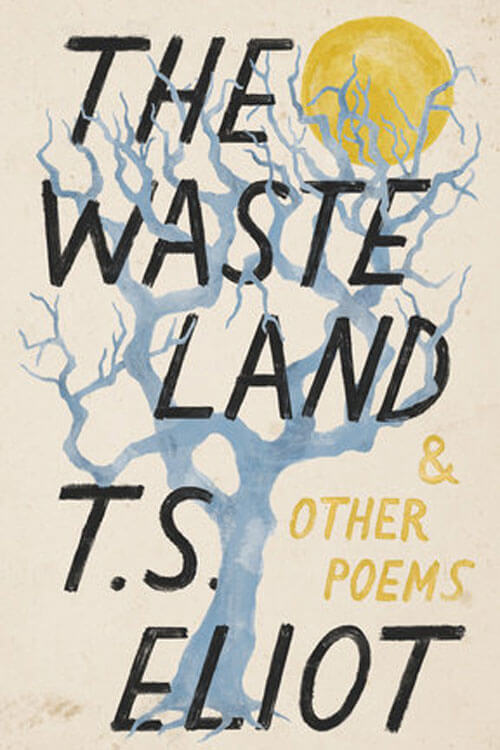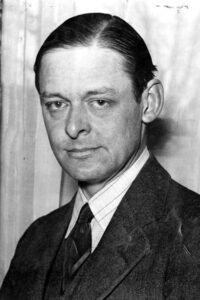
The Waste Land
Who is the third who always walks beside you? 360 When I count, there are only you and I together But when I look ahead up the white road There is always another one walking beside you Gliding wrapt in a brown mantle, hooded I do not know whether a man or a woman – But who is that on the other side of you?
What is that sound high in the air? A Murmur of maternal lamentation. Who are those hooded hordes swarming over endless plains, stumbling in cracked earth 370? Ringed by the flat horizon only. What is the city over the mountains? Cracks and reforms and bursts in the violet air. Falling towers. Jerusalem, Athens, Alexandria, Vienna, London Unreal.
A woman drew her long black hair out tight And fiddled to whisper music on those strings. Bats with baby face in the violet light 380 Whistled and beat their wings And crawled head downward down a blackened wall. Upside down in the air were towers Tolling reminiscent bells that kept the hours, And voices sang out of empty cisterns and exhausted wells.
Read or download Book
T. S. Eliot
Thomas Stearns Eliot OM (26 September 1888 – 4 January 1965) was a poet, essayist, publisher, playwright, literary critic and editor.
Biography.
He is considered to be one of the 20th century’s greatest poets and a central figure in English-language Modernist poetry. His trials in language, writing style, and verse structure reinvigorated English poetry. He is also noted for his critical essays, which often reevaluated long-held cultural beliefs.
Born in St. Louis, Missouri, to a prominent Boston Brahmin family, he moved to England in 1914 at 25 and settled, worked, and married there. He became a British subject in 1927 at 39 and renounced his American citizenship.
Eliot first attracted widespread attention for his poem “The Love Song of J. Alfred Prufrock” from 1914 to 1915, which was considered outlandish at the time of its publication. It was followed by The Waste Land (1922), “The Hollow Men” (1925), “Ash Wednesday” (1930), and Four Quartets (1943). He was also known for seven plays, particularly Murder in the Cathedral (1935) and The Cocktail Party (1949). He was awarded the 1948 Nobel Prize in Literature “for his outstanding, pioneer contribution to present-day poetry”.
Life
Early life and education
The Eliots were a Boston Brahmin family with roots in England and New England. Eliot’s paternal grandfather, William Greenleaf Eliot, had moved to St. Louis, Missouri, to establish a Unitarian Christian church there. His father, Henry Ware Eliot (1843–1919), was a successful businessman, president and treasurer of the Hydraulic-Press Brick Company in St Louis. His mother, Charlotte Champe Stearns (1843–1929), who wrote poetry, was a social worker, a new profession in the U.S. in the early 20th century. Eliot was the last of six surviving children. Known to family and friends as Tom, he was the namesake of his maternal grandfather, Thomas Stearns.
Eliot’s childhood infatuation with literature can be ascribed to several factors. First, he had to overcome physical limitations as a child. Struggling from a congenital double inguinal hernia, he could not participate in many physical activities and thus was prevented from socialising with his peers. As he was often isolated, his love for literature developed. Once he learned to read, the young boy immediately became obsessed with books, favouring tales of savage life, the Wild West, or Mark Twain’s thrill-seeking Tom Sawyer.
Poetry
For a poet of his stature, Eliot produced relatively few poems. He was aware of this even early in his career; he wrote to J. H. Woods, one of his former Harvard professors, “My reputation in London is built upon one small volume of verse, and is kept up by printing two or three more poems in a year. The only thing that matters is that these should be perfect, so each should be an event.”
Typically, Eliot published his poems individually in periodicals, small books, or pamphlets and then collected them in books. His first collection was Prufrock and Other Observations (1917). 1920, he published more poems in Ara Vos Prec (London) and Poems: 1920 (New York). These had the same poems (in a different order), except that “Ode” in the British edition was replaced with “Hysteria” in the American edition. In 1925, he collected The Waste Land and the poems in Prufrock and Poems into one volume and added The Hollow Men to form Poems 1909–1925. From then on, he updated this work as Collected Poems. Exceptions are Old Possum’s Book of Practical Cats (1939), a collection of light verse; Poems Written in Early Youth, posthumously published in 1967 and consisting mainly of poems published between 1907 and 1910 in The Harvard Advocate. And Inventions of the March Hare: Poems 1909–1917, material Eliot never intended to have published, which appeared posthumously in 1996.
Influence
Eliot influenced many poets, novelists, and songwriters, including Seán Ó Ríordáin, Máirtín Ó Díreáin, Virginia Woolf, Ezra Pound, Bob Dylan, Hart Crane, William Gaddis, Allen Tate, Andrew Lloyd Webber, Trevor Nunn, Ted Hughes, Geoffrey Hill, Seamus Heaney, F. Scott Fitzgerald, Russell Kirk, George Seferis (who in 1936 published a modern Greek translation of The Waste Land) and James Joyce. T. S. Eliot strongly influenced 20th-century Caribbean poetry written in English, including the epic Omeros (1990) by Nobel laureate Derek Walcott and Islands (1969) by Barbadian Kamau Brathwaite.






